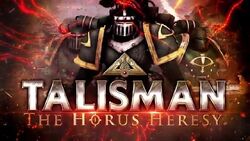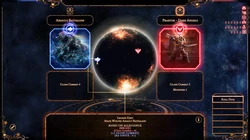
The logo of Talisman: The Horus Heresy
Talisman: The Horus Heresy is a digital board game set in the Warhammer 40,000 universe after the events that transpired during the Horus Heresy. The game uses the traditional Talisman rules system with some adaptations for the Warhammer 40K theme. This adaptation is beautifully crafted with some amazing visuals of planets, solar systems, and space anomalies. The new combative team play will appeal to fans of Talisman and the Horus Heresy alike. It's a unique adaptation of Talisman that has been tailored specifically for digital platforms. In Talisman: The Horus Heresy, the player's experience of the Talisman game is scaled up exponentially, exploring not a kingdom, but a whole galaxy in the 31st Millennium. No longer will you be fighting for the Crown of Command, but for the very future of humanity...
Gameplay[]

A player chooses either Loyalist or Traitor factions
During gameplay, a player takes on the role as one or more of the galaxy's bravest heroes or malicious villains, with up to three others in direct head-to-head or team-based gameplay. You can choose your allegiance between Loyalist and Traitor and have your Warlord command Space Marines, spacecraft fleets, and even battle tanks. They are the most powerful beings in the galaxy and their followers are legion. A player will then make their way across the galaxy to either defeat the Emperor or Horus, depending on their chosen faction.
The game was created to look like its original tabletop counterpart, but the graphics looked too outdated. After Nomad Games fixed the visuals complaint, it now has a highly detailed and interactive game board. The gameplay feels as though a person is indeed playing a Talisman game, but there have been enough tweaks to the game that differentiate this title from being just a Talisman clone. However, the drawbacks of this game is that it still relies on RNG (random number generation) for a huge chunk of the player interactions with the board or against one another, be they on specific tiles or in battle. This may be a breaking point for some prospective players who like to remain in complete control.
Talisman: Horus Heresy keeps some of the basic statistics associated with a player's chosen character, but makes a couple of thematic changes for continuity. Instead of a health pool, a player has Resolve, which works in the exact same way as health - lose it all and your character is eliminated from the game. Fate received no changes and still works as a re-roll mechanic in times of need. The same can be said of Resources, which replaces Gold.

An example visual of the game's chosen forms of combat, which can be close or ranged
The way in which combat resolves has had a decent rework that makes much more thematic sense. Strength and Craft stats have been replaced with two different combat statistics: Close and Ranged Combat (making much more thematic sense for the W40k universe). All characters start with a base value that can be increased throughout the game. There are tiles that can increase one or more of these values with an RNG roll or a player can gain experience points on them by winning encounters.
The experience points mechanic replaces the trophy method used in the original Talisman, where a player could hold on to defeated creatures and then discard them to increase one of their statistics. Now a player earns experience for each defeated encounter, which in turn increases the statistic once enough experience has been earned. What most people love most about this new approach is that it feels so much more realistic and immediate, giving a strong sense of character growth as you play the game.
The Strategy stat is used to hold Strategem cards. These are essentially spells. Just like a player's combat statistics, this stat will need to be leveled up in order to increase the maximum number of Strategem cards a player's character can hold. All of the statistics start at base values depending on your chosen Warlord and all of these cannot be depleted beyond their starting point, except Resolve and Resource.
All of these changes make sure that Talisman: Horus Heresy feels distinctly different to the classic Talisman game. The core mechanic of a die roll to move is still here, though - the old-fashioned movement mechanic seen in many tabletop games and even some digital board games. In this game, a player can re-roll using Fate if they feel they have no benefit from or want to avoid particular tiles.

The 'My Collections' tab allows a player to access all of their Dataslates
The usual encounter deck is filled with Dataslates which consist of combat encounters, special characters, equipment, resources, and other special event cards. Some tiles require a player to encounter one or more Dataslates at a time, which will either be of great benefit or a significant hindrance. Some Dataslates will remain on the tile and will reduce the number of new encounters a player might have there, if any.
Another difference from Talisman that players like is that encountered Units are divided into Loyalist or Trailer camps, adding another dimension to combat. A player can try to rejoin a Unit to their side, which avoids a combat and any subsequent penalties should they fail. Some Warlords have abilities that use or somehow interact with collected Units, such as sacrificing one before combat to get a +3 to their roll.

If a player makes it to the center of the board, they face off against their faction's main enemy - Horus or the Emperor.
Just like in the original Talisman game there are tiles that have their own text effects. These generally don't have any Dataslates to encounter, but will have their own RNG roll events or encounter requirements, such as passing to the inner ring. A player can encounter anything from shops to buying equipment to their home planet, where they can roll for a number of different positive (and negative!) effects.
Features[]
The basics are covered when a player encounters the main menu of Talisman: Horus Heresy. Play lets an player set up a local game consisting of solo or team-based play. A player can do this with other people or have the A.I. fill the open slots, which can be a decent way to learn the game before they want to try their luck online. Everything in this mode will provide all players with a perfect information scenario. All of the Dataslates and Strategems a player picks up will be known by all players.
The Online Multiplayer mode features the same options as the Play mode, solo or team-based options. However, this will mean some of the Strategems a player can pick up will remain a secret from the opponents until they are played. The fact that the game can support up to four players should encourage players to participate in some team battles. Not only is it more fun to play with another person, but it's also a great way to find new friends online as you share a similar bond through your love of either Talisman or Warhammer 40,000 games.
Signing in to an individual player's profile will allow you to earn profile and Warlord experience at the end of the game. This will happen whether you win or lose as there are multiple awards for achieving certain milestones in the game. This will unlock Steam achievements along with showing everyone your prowess with particular Warlords.
Other features of Talisman: The Horus Heresy:
- Command one of the eighteen Space Marine Legions that fought during the Horus Heresy.
- Play as one of eight of the galaxy's greatest heroes such as Roboute Guilliman or most notorious villains such as Angron.
- Multiplayer for up to 4 players.
- Challenge or team-up with your friends locally and online.
- Play against AI opponents.
There will be expansions that a player can buy as shop page is already set up inside of the game. These will increase the longevity of your game and offer up new Dataslates and Warlords to play with. All of your purchases and associated material can be seen in 'My Collection'.
Includes free High Chaplain Erebus DLC as of March 2016. The Dark Apostle Erebus is one of the most prominent members of the Word Bearers Traitor Legion and a member of the Dark Council of Sicarus. He was one of the first Space Marines to knowingly turn to Chaos became the harbinger of the Horus Heresy. He was personally responsible for first converting his own Primarch Lorgar, and then Warmaster Horus to the worship and service to Chaos. His drive for spiritual knowledge led him into the arms of the ruinous powers and through their guidance he planned the downfall of The Emperor and all he had wrought.
Talisman: The Horus Heresy available on PC via Steam, Android devices, and launches on iOS in May 2016.
Critical Reception[]
"This game is a great addition to the Talisman family. If you are looking for the board game experience but your friends are too far away, then check out Talisman: Horus Heresy – you won't be disappointed!"
- Bell of Lost Souls Rated: 4/5
"The Horus Heresy offers a wonderful, local (and online) multiplayer experience for up to four players, and its simple gameplay offers an oddly relaxed approach to galactic warfare."
- Brash Games Rated: 7/10
- IGN Russia Rated: 7/10

